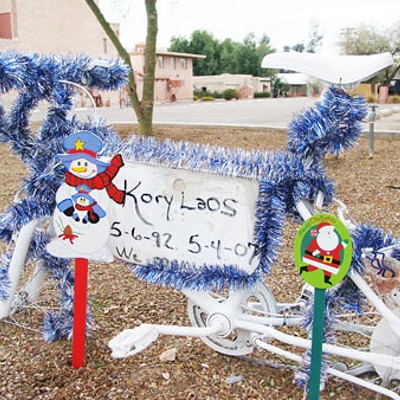In tumultuous economic times, added attention is often given to the fundamentals of American life. These basics—food, shelter, employment and democracy—were the focus of numerous stories during the past year.
One article looked at the growing number of people relying on nonprofit agencies for assistance ("More Poor," March 12). It noted the Community Food Bank had distributed 12,200 emergency food boxes in January.
Food Bank spokesman Jack Parris reports the number for November was almost 17,300—a staggering 42 percent increase in comparison to January.
Going in the opposite direction are the financial resources of the Tucson Housing Trust Fund. In "Insufficient Support," (June 4), we reported that the fund had raised slightly more than $500,000—and spent or committed almost all of it.
Today, the fund is down to a measly $2,644 in uncommitted funds. Another $120,000 has already been committed to down-payment assistance.
People on the far eastside were the focus of "Money and Marriage"( Jan. 15), which reviewed a dispute between residents living near Tanque Verde Loop Road and John Fazio, who wants to build a church in the area that the neighbors argue is actually a wedding business.
Pima County officials sided with the neighbors and turned down Fazio's application, a move which was then backed by the Board of Adjustment. In response, Fazio says he filed a $707,000 claim against the county that will certainly lead to litigation. "The county's actions," he suggests, "weren't motivated by zoning, but were politically motivated."
Neighbor Murray Stein counters: "We still believe it's a business operating as a church." He says his group's fundraising is going well, and they have retained their own attorney.
On another housing front, "Financial Futures" (Jan. 22) examined what several 30-somethings thought of the immediate future. One of them, Sebastian Lauber, was considering buying a house with his wife.
"On July 1 we bought a small home on the westside," he says. "It was a pretty good deal, and it's a great feeling being a homeowner, even if it is a little scary."
The city's up-and-down financial support for a job-training program, JobPath, was outlined in "Starts and Stops" (April 30). The agency was waiting to see how much city funding it would receive for the coming fiscal year; figures up to $500,000 were being considered.
In the end, JobPath was allocated $380,250, but its director, Herminia Cubillos, says that JobPath won't be receiving all of that money because of the city's ongoing financial crisis.
"We've been told it will be cut 10 percent (this fiscal year)," Cubillos says, "and another 30 percent next year." Earlier this week, however, City Manager Mike Letcher proposed that all outside agencies see a 20 percent cut this year. At its Jan. 5 meeting, funding reductions for JobPath and other outside agencies will be one of many budget-balancing measures considered by the Tucson City Council.
Conditions in the workplace were the topic of "Privacy, Please" (July 30) about a controversial decision by Tucson's General Services Department to make employees utilize a biometric time clock to register work hours. Ron Lewis, director of the department, says the finger scans utilized by the system have been done away with and replaced by the use of a password.
The city also found itself in hot water over its tentative design of the downtown Links roadway ("Missing Links," Sept. 10). As proposed, the roadway would eliminate vehicular access to Benjamin Supply Company at Sixth Street and Seventh Avenue—and that, according to owner Mark Berman, would doom the business.
Things started shifting even before the story appeared, and Berman says his design consultants have made a proposal to city representatives. "As far as I can tell, everything's on target," he acknowledges.
Also on target, apparently, is compliance with the billboard settlement reached last month in the long running dispute between the city of Tucson and Clear Channel Outdoor.
The pending settlement was profiled in a springtime piece ("Positive Signs," April 16), and the initial phase calls for the first 10 signs to be removed from local streets by the middle of February. In an e-mail message, City Attorney Mike Rankin indicates that five billboards not in the agreement have also been recently eliminated.
"Batter Up?" (July 16) looked at the Pima County Sports and Tourism Authority and its efforts to improve youth-sports facilities and maintain spring-training baseball in Tucson.
Director Mike Feder says the authority is waiting to see what Pima County decides to do about a bond-election date before deciding whether to ask for voter approval of a small tax increase in either 2010 or 2011.
Among the improvements Feder lists as possibilities for youth sports: lighting all 12 soccer fields at the Kino Sports Complex, adding softball fields at Lincoln Park and on Tucson's northwest side, and improving swimming and tennis opportunities.
While building a new spring training stadium is still a possibility with voter approval, the authority has also been working to bring two Japanese teams here after the Rockies and Diamondbacks exit town following spring training in 2010. The goal, Feder says hopefully, is to have the Japanese teams play 15 games against Major League Baseball competition in Tucson beginning in 2011.
Not so hopeful was wheelchair-bound Abby Road, the focus of "In the Way of Democracy" (Oct. 15), about her problems accessing a new polling place.
Before the November election, Road received a letter from Tucson City Clerk Roger Randolph suggesting an alternative route she could take to the polls.
However, "I faced the same problems," Road (not her real name) reports of the option. "It was painful and dismissive of me as a citizen."
Better news might come from a comment Randolph made about the polling place Road went to in November.
"We probably won't use it again," he says, which could make for a happier New Year for at least one Tucson resident.










